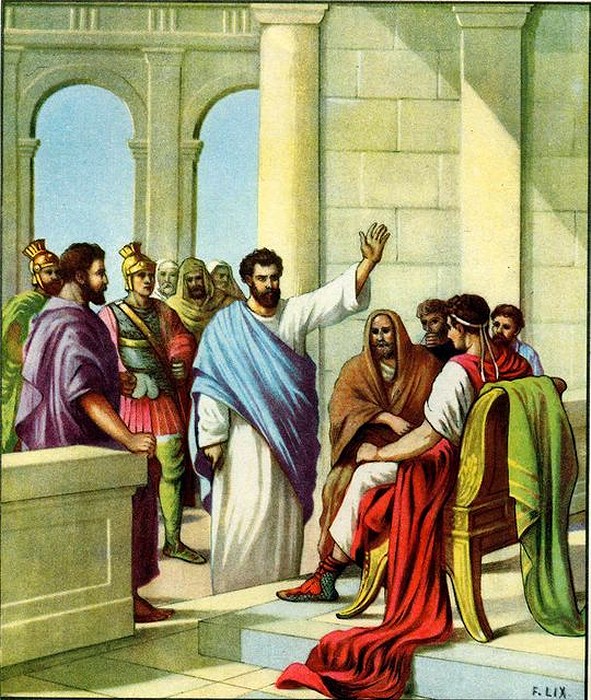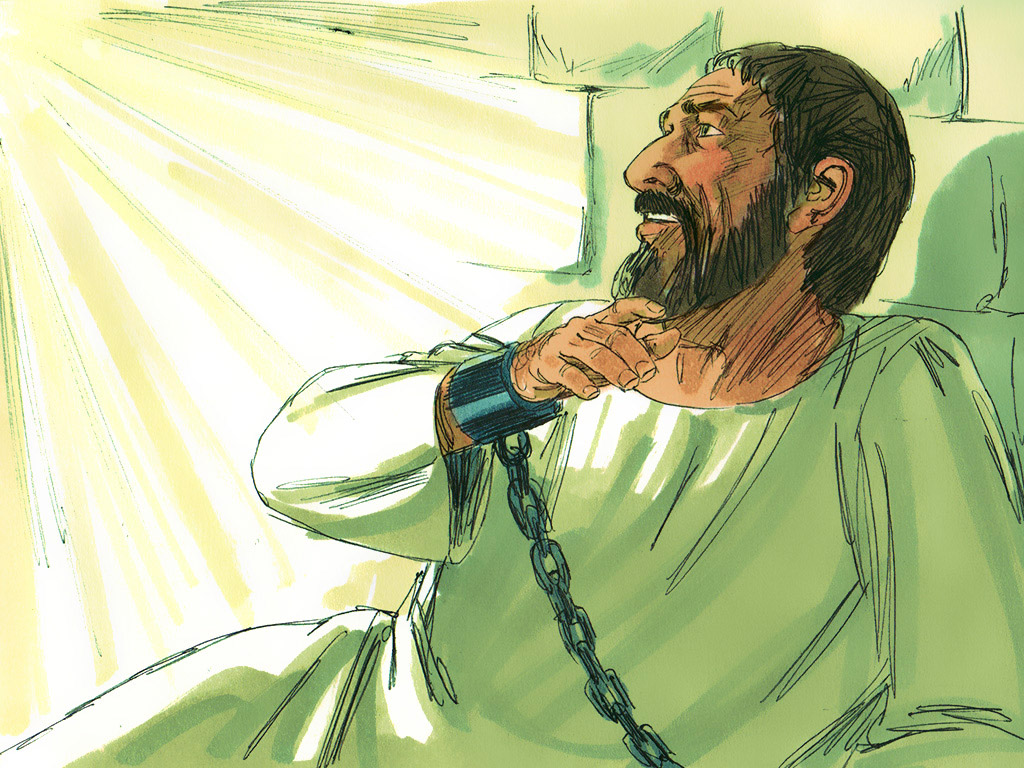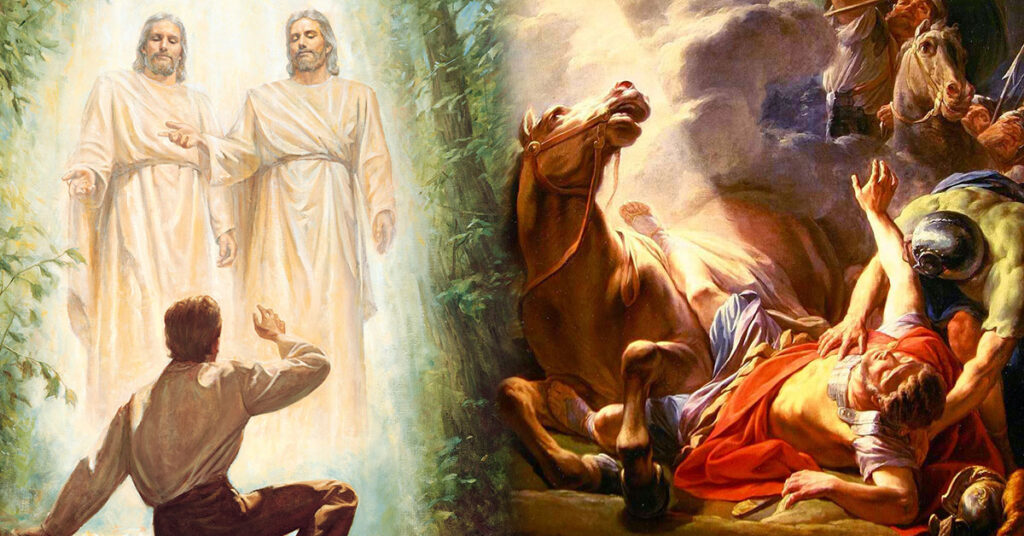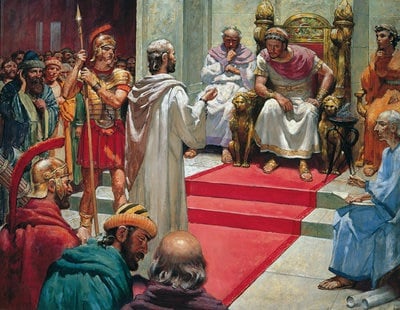To accompany your Come Follow Me study for July 31-August 6
In addition to reading the indicated chapters, you may wish to:
Read the applicable portions of the New Testament Institute Student Manual at:
See the following videos:
- Come Follow Me (July 31-August 7) | To Rome!| Acts 22-28 at Come Follow Me (July 31-August 7) | To Rome!| Acts 22-28 – YouTube
- The Road to Damascus (which you may have seen three weeks ago when we first met Paul in Acts 9) at The Road to Damascus – Saul Takes his Journey – YouTube
- Be of Good Cheer – The Lord Comforts Paul at Be of Good Cheer – The Lord Comforts Paul – YouTube
- Acts of the Apostles (minute 2:26:21 to 3:08:08) at https://www.youtube.com/watch?v=q5bTIUrUw0M
If you would like a Kahoot game related to this material which you could use for personal study or use with your family or your class, click here: https://create.kahoot.it/share/acts-22-28/359fb514-11e9-4787-ba9f-862d1b93b8d6. (To use it with a group, after clicking on this link, you will need to log into Kahoot, creating a free account if you have not done so previously, then click on the blue “Start” button.)
Points to Ponder in Acts 22-28
1. Why would you suppose the Church’s Bible Videos series connects the “Road to Damascus” video with Acts 22 rather than with Acts 9, where the story is first told?

2. It is easy to get confused by the details of Paul’s appearance before various tribunals in these chapters, and it probably is not important to remember the entire story. What ten to twelve passages from these chapters would you single out as being the most important for us to remember, and why?

3. What was so clever about Paul’s saying, “I am a Pharisee, the son of a Pharisee: of the hope and resurrection of the dead I am called in question”? (23:6)
4. Why would you guess the Lord appeared to Paul at the time He did in 23:11?

5. Where else do we see the phrase at the end of 24:16?
6. Joseph Smith compared his own experiences with those of Paul before King Agrippa. (JS-H 1:23-25.) What are the greatest parallels you can see?

7. It has been said, “Of all sad words of tongue or pen, the saddest are these: It might have been.” In Acts 26:28, King Agrippa is quoted as saying, “Almost thou persuadest me to be a Christian.” Other translations, such as the New International Version, render it more like, “Do you think that in such a short time you can persuade me to be a Christian?” But let’s assume the King James Version interprets it correctly, in which case it would be recording a tragedy. What other situations occur to you most readily where the word “almost” would be especially unfortunate?

Possible Answers to Points to Ponder in Acts 22-28
1. Why would you suppose the Church’s Bible Videos series connects the “Road to Damascus” video with Acts 22 rather than with Acts 9, where the story is first told?
I have read no authoritative explanation, but I can think of three possible reasons:
- The story in Acts 22 is more accurate, indicating that those with Paul saw the light but didn’t hear the voice, as the Joseph Smith Translation attests.
- The Acts 22 account is more specific on the reason for Paul’s baptism.
- The Acts 6-9 block has more other doctrinal matters to discuss than Acts 22-28, so the Come Follow Me people may have felt it helpful to include the video later to avoid its being overlooked earlier.
2. It is easy to get confused by the details of Paul’s appearance before various tribunals in these chapters, and it probably is not important to remember the entire story. What ten to twelve passages from these chapters would you single out as being the most important for us to remember, and why?
My list would probably include:
- 22:6-16: The second account of Paul’s conversion on the road to Damascus, highlighting the instruction of Ananias to “arise, and be baptized, and wash away thy sins.”
- 23:3-5: Once Paul learned that another Ananias, who commanded that Paul be smitten on the mouth, was the high priest, Paul essentially took back his angry words against him, quoting Exodus 22:28 as “Thou shalt not speak evil of the ruler of thy people.” This applies not only to our religious leaders but those in the political realm. We may disagree vehemently with them and even try to get them replaced at the next election without resorting to personal attacks and insults.
- 23:11: Jesus appeared again to Paul and told him of his future mission in Rome.
- 24:16: As Paul, we can all aspire to have a “conscience void of offence toward God, and toward men.”
- 24:27: Paul was in prison under Felix for two years, later enduring an eventful and unpleasant voyage to Rome, and remained in prison in Rome for an undisclosed amount of time before his eventual execution. Unquestionably, Paul was one of the greatest missionaries the world has ever seen and one of the most enduring theologians.
- 26:9-19: A third account of Paul’s conversion on the road to Damascus.
- 26:28: Agrippa said to Paul, “Almost thou persuadest me to be a Christian.” “Almost” may be among the most tragic words in the English language.
- 27:23: Paul is visited by an angel who promises that the prisoners and crew will be saved during the upcoming shipwreck.
- 27:31: “Except these abide in the ship, ye cannot be saved.” A good analogy could be made to the importance of staying in the “ship” of the gospel and church, as there is no salvation outside of them.
- 27:38: Those on board the ship cast valuable cargo overboard in order to save the ship. We might consider what we could well get rid of in our lives (or homes) that would make our lives happier and more productive.
- 28:3: Paul suffers no ill effects from being bitten by a poisonous snake.
- 28:8-9: Paul heals various people on the island of Melita (currently called Malta).
3. What was so clever about Paul’s saying, “I am a Pharisee, the son of a Pharisee: of the hope and resurrection of the dead I am called in question”? (23:6)
As the Pharisees believed in the resurrection and the Sadducees did not, Paul thus succeeded in getting the Pharisees and Sadducees contending with each other, taking the focus off from him and bringing the Pharisees to his defense.
4. Why would you guess the Lord appeared to Paul at the time He did in 23:11?
Great spiritual experiences typically just precede or just follow great trials. Paul was in prison and would essentially remain so the rest of his life. His life was constantly in danger and would continue to be, not only from mortal enemies but from a storm at sea and the bite of a poisonous serpent. This vision would do much to reassure Paul that the Lord was still with him and to prepare him for the tribulations ahead.
5. Where else do we see the phrase at the end of 24:16?
We see it in D&C 135:4, where Joseph Smith applied it to himself as he surrendered to his enemies in Carthage and knew he would not come out alive.
6. Joseph Smith compared his own experiences with those of Paul before King Agrippa. (JS-H 1:23-25.) What are the greatest parallels you can see?
The greatest similarities may be their certainty of the vision each had experienced, and their boldness in declaring it, in spite of the skepticism of their listeners and the constant persecution and eventual martyrdom each suffered.
7. It has been said, “Of all sad words of tongue or pen, the saddest are these: It might have been.” In Acts 26:28, King Agrippa is quoted as saying, “Almost thou persuadest me to be a Christian.” Other translations, such as the New International Version, render it more like, “Do you think that in such a short time you can persuade me to be a Christian?” But let’s assume the King James Version interprets it correctly, in which case it would be recording a tragedy. What other situations occur to you most readily where the word “almost” would be especially unfortunate?
Possibilities could include:
- The driver almost fastened his seatbelt.
- The plane almost had enough fuel to get across the ocean.
- I almost joined the Church.
- I almost went on a mission.
- I almost married in the temple.
- I almost qualify for a temple recommend.
- I almost quit taking illegal drugs.
- I almost read the Book of Mormon once.
- I almost paid a full tithing last year.
- I almost went to college.
